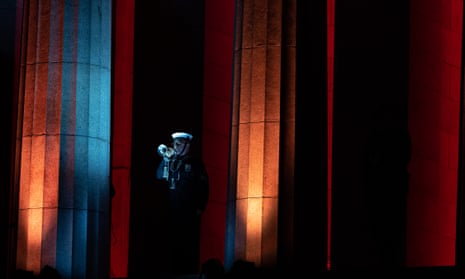Extract from The Guardian

This anomaly has never been more pronounced than this Remembrance Day, as political structures, national and global, so manifestly fail to reckon with history’s legacies and stop them repeating.
It’s political leaders who declare wars. They deploy the mostly young men and women who die horribly or are maimed. Meanwhile, countless innocent civilians are always disproportionately, collaterally killed. And then, dust settled, the politicians get to lead commemorations which, when you strip away the ecclesiastical language surrounding such solemnity, invariably seek to justify the human “sacrifice” they are ultimately responsible for.
For many – especially the young with no lived memory of 9/11 and potentially less understanding of Hiroshima, Nagasaki, the Nazi invasion of Poland, let alone the assassination of Franz Ferdinand and the killing machine of the Somme – the world has, rightly, never felt more dangerous or inhuman.
Meanwhile, the leaders, who do – or at least should – be intimate with this history, are for the most part loath to honestly publicly parse it for all of the legacy of fault it would concede to the political classes.
In both the October Hamas terrorist murders of approximately 1,400 Israelis and other nationals (240 more were kidnapped) and the Netanyahu government’s asymmetrical response in Gaza, the violent impacts have been most acutely borne by civilians, bringing the world – and humankind – to a new precipice of danger and brutality.
A lot of politicians will talk a lot about history today. But remember, too few ever learn from it
The Middle East and all of the dominoes that line up correspondingly behind Israel, and Arab, Muslim and other opponents of the Gaza invasion (for all the ongoing war’s mutually criminal conduct), compounds a global trauma already experienced over Russia’s invasion of Ukraine.
Right now, civilisation seems beset by a new postmodern epoch of human failure, a place permeated with human misery and pain. There is a corresponding sense of distress and helplessness, a powerlessness and ennui that global leadership – for all its multinational political manifestations, not least the United Nations – is utterly impotent when it comes to restoring peace, let alone guaranteeing that the rules of law are followed.
Historically Australia, for all its geographic isolation, has sometimes felt blithely inured to the geopolitical cataclysms of Europe and the Middle East. We tend to focus more once our troops are deployed and injured or killed. But that tyranny of distance no longer applies in today’s global village.
Countless Australians, far away from the two big global war zones in the Middle East and Europe, daily articulate a sense of both guilt and of immense fortune (different sides of the same emotional coin), that by virtue of birth alone they are physically untouched by the two big conflicts. The trauma of others in our Middle Eastern, Muslim and Jewish communities here (many with family and friends in the war zone) should be front of national mind, especially today, for most are united by grief and a yearning for peace that Hamas, Israel and the apparatus of multilateralism are presently incapable of delivering.
Australia has a long, complicated and somewhat contradictory foundational attachment to war, especially due the invasion and failed occupation of Gallipoli in 1915–16. You’ll hear a lot about that foundation myth today and how the human “loss” and “sacrifice” (331,000 Australians deployed; 60,000 killed; 155,000 wounded) was the seminal event upon which the new Australian federation was built, Australia having followed an empire into its first major war of too many to come.
But national history isn’t binary. It’s not a case of either/or.
Frontier wars in Australia (which by some credible accounts killed 60,000 Indigenous people), for all their violent dispossession and legacies of generational disadvantage and trauma, are the foundational conflicts upon which the white federation was literally built. But in terms of Australia’s more formal martial history – as interpreted by generations of political leaders and through the official citadel to Anzac, the Australian War Memorial – frontier conflict remains at best a commemorative sideshow.
The call of history has only partially – or selectively – been heard by Australia’s political elites, opinion-makers – and, of course, voters, as evidenced by the recent resounding voice referendum no vote. Colonial Australian history, replete as it is with Black dead and violently dispossessed traditional lands, was not a sufficient exhortation for yes, it seems.
I fear that after the referendum campaign – whose more negative proponents boldly, falsely argued colonialism was not detrimental to Aboriginal and Torres Strait Islander people – an even greater inertia will befall, and more deliberate obstacles impede, the official memorialisation of Australia’s true and complex war history.
A lot of politicians will talk a lot about history today. But remember, too few ever learn from it. And that’s why it keeps repeating.
No comments:
Post a Comment